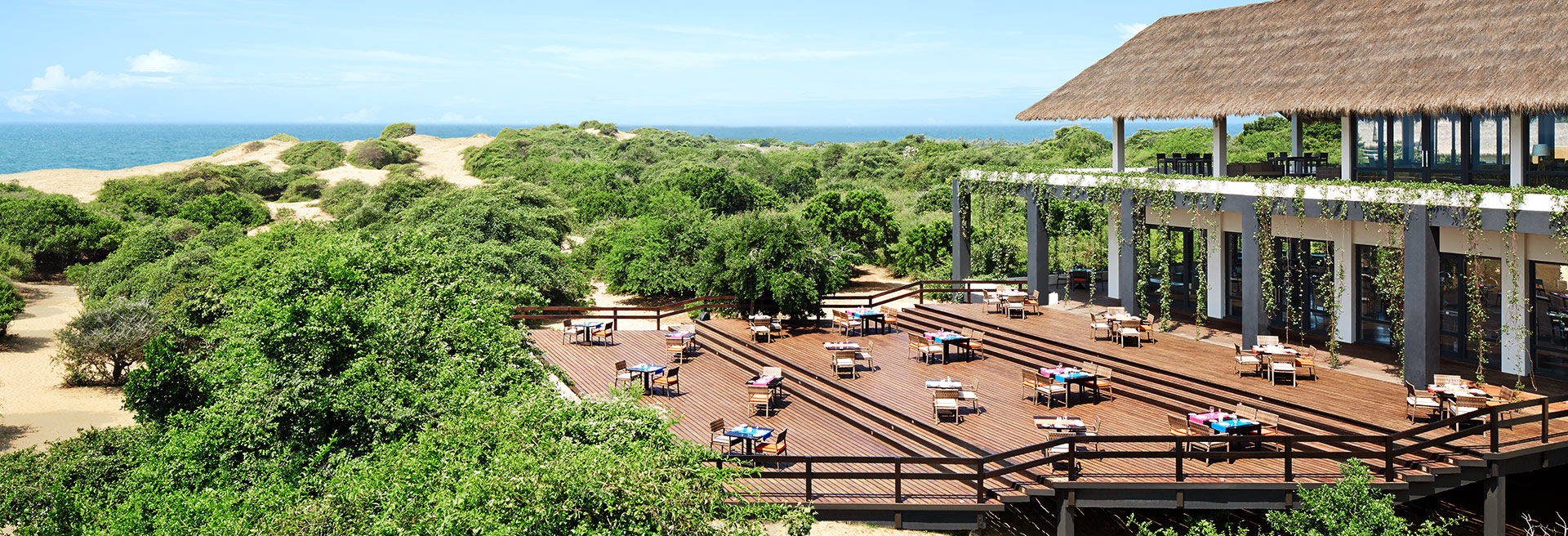Water & Waste
Conserving Our Natural Resources
As a thriving tropical island, we are fortunate to have an array of natural resources that surround us wherever we are. Alongside their enchantment as a source of inspiration for our hospitality, many of these resources also play an integral role in hotel operations. The growth of tourism in Sri Lanka has seen an increased demand of resources, and in turn highlighted the importance of preserving the environments we call home. Our family remains committed to the optimization of resources across all properties, where every effort is made to reduce consumption and increase reusability in the spirit of sustainable hospitality.
Water Usage Management
With an innovative legacy of advanced water management in ancient Sri Lanka, our commitment to conserving water is significant as much as it is inherent. A number of our homes across Sri Lanka have been built to reduce dependence on the national water supply, achieved through reverse osmosis units which desalinise brackish or sea water, or through rainwater harvesting methods that use our lakes, ponds and roof gutter systems. The water used throughout hotel and villa operations is diligently managed through a series of sustainable processes. Without compromising on your comfort, we ensure the use of accessories with a flow rate below stipulated standards. Such accessories include low-flow showerheads, dual flush cisterns, and sensor operated urinals.
Our Associates are extremely mindful with this usage of water, and pay close attention to leaks and points of water wastage on a daily basis. The establishment of effluent treatment plants support this vigilance by enabling wastewater generated to be treated and reused for on-site purposes such as irrigation, cistern flushing, and make up water for cooling towers. While black and grey water is only treated biologically without any additional chemicals, newer properties in our family collect black, grey and laundry water to be treated separately – thereby improving the efficiency of our overall treatment system.
Solid Waste Management
Similar to our water management processes, all material use is meticulously managed to ensure minimal waste and maximum reusability. For instance, many of our properties use alternatives to single-use plastics such as branded glass water bottles, ceramic or glass amenity containers, linen bags, and cane baskets for laundry. In addition, beverages are served with drinking straws only upon your request, while reusable crates are used when fruits and vegetables are purchased for kitchen operations. Bulk purchasing is encouraged whenever possible so as to reduce waste from secondary packaging material, which we also request our suppliers to forego when delivering purchases to our hotels and villas. Any waste generated across our family is segregated at the source, with dry waste such as paper, plastic, metal and glass then being inventoried and sent out for third party recycling.
Organic Waste Management
All food waste generated across our homes of Sri Lankan hospitality is fed to onsite biogas digesters, composted or used as animal feed, while garden clippings and sweepings are composted. Supplemented by sludge from wastewater treatment plants, onsite biogas digesters at certain properties receive a daily load of food waste. The first digester was set up at Jetwing Blue in Negombo, and over time, newer installations were established with various process improvements such as external hydrolysis chambers, agitation, and heating – resulting in a faster processing time of just 2 weeks for complete digestion. The biogas produced is then used to fuel stoves in staff kitchens and/or as supplementary fuel in biomass boilers.
Our family of hotels employs a variety of composting methods for waste processing. Conventional composting methods for garden waste are traditional above ground piles or the windrow method – which takes approximately 40 days. Our enhanced process compositing machine available at certain properties operates on a cycle of three weeks. This process is used for food waste and off-cuts, and is accelerated by the removal of moisture, mechanical grinding, and aeration. As a contained process, this composting machine does not attract flies or give off any odour. The compost product generated by these processes is then later used in our gardens as nutrient rich soil enhancers.


